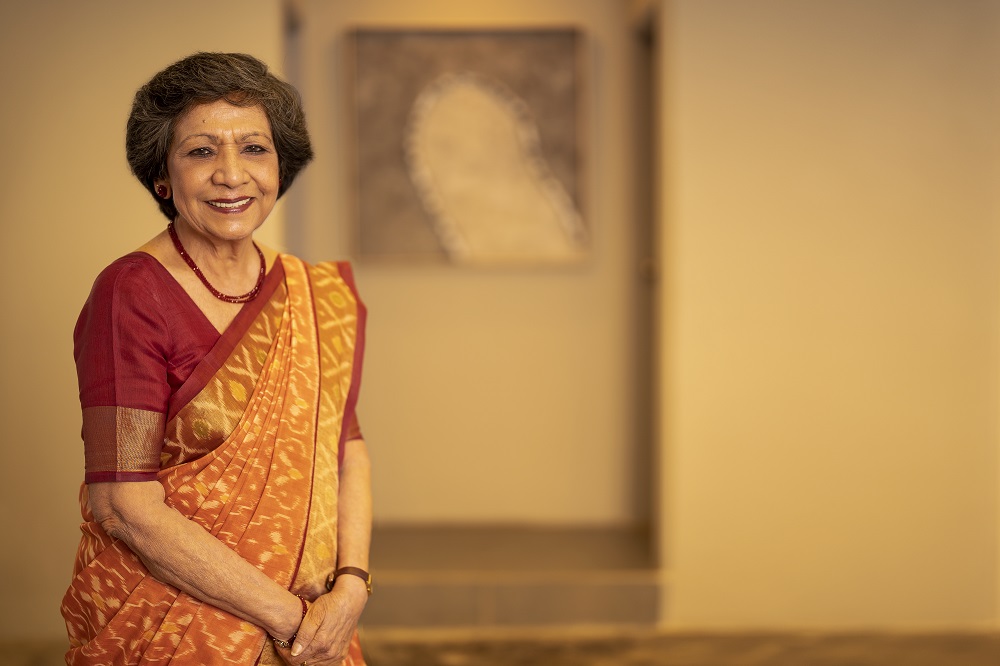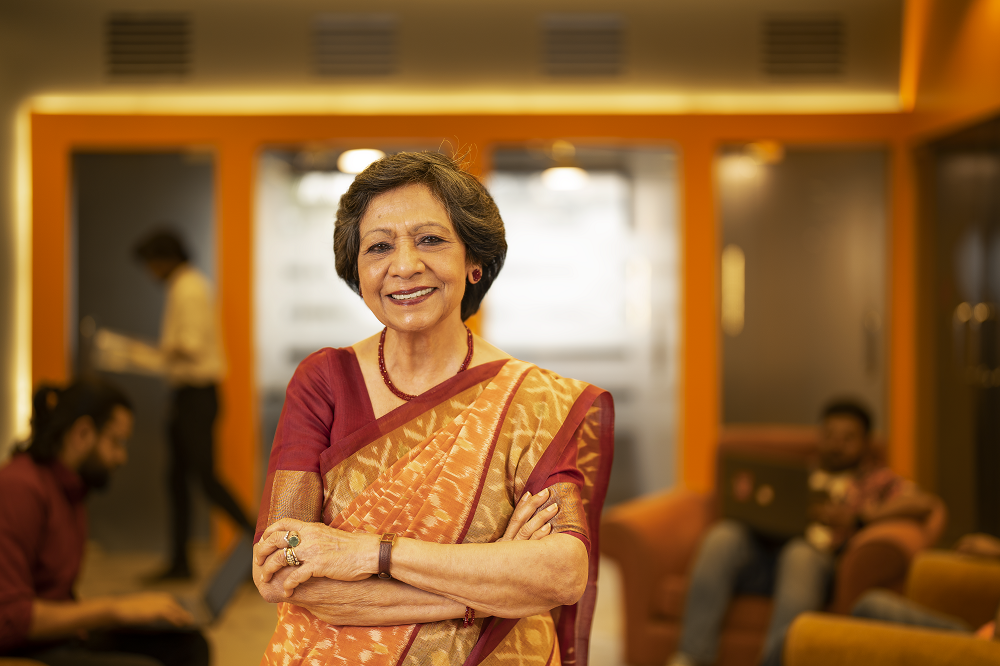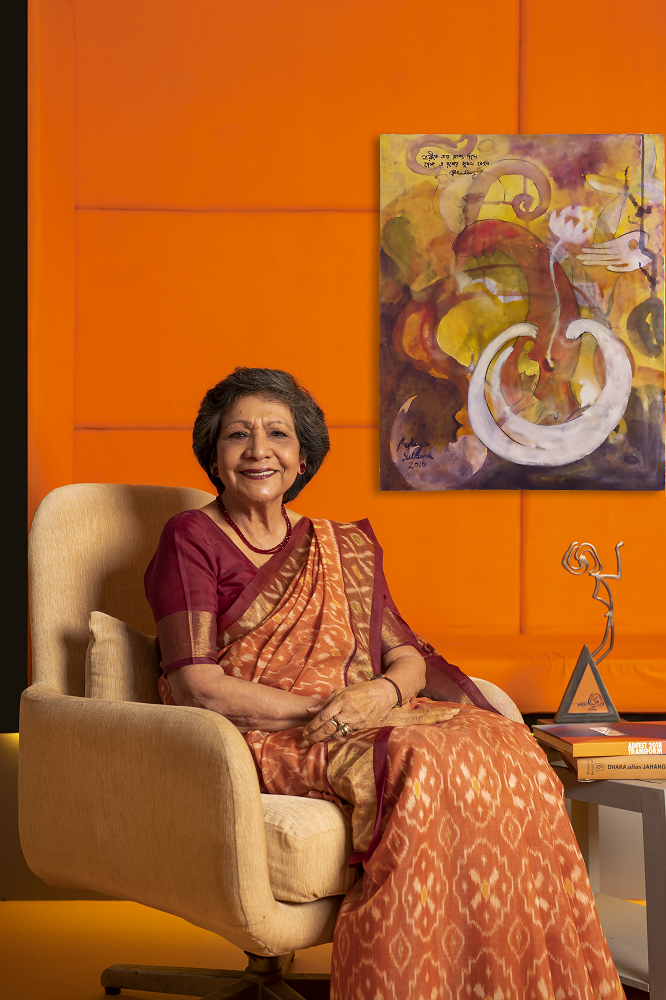From the first woman to open an advertising agency in newly independent Bangladesh, to the first woman president of the Dhaka Club, Geeteara Safiya Chowdhury is a pioneer in many fields. The enterprising Chairperson of Adcomm sat down with MWB to share some truly epic stories
By Sabrina Fatma Ahmad
“I am the eldest daughter of the eldest son in my family,” Geeteara Safiya Chowdhury tells us when we meet. “My dadi was initially disappointed, because of the social mores of that time, but when she saw how much my father loved me, she had no choice but to also learn to love me.”
Her father raised her on a diet of affection and discipline, never making any concessions to her gender. “If I mumbled, he would tell me to speak up; if I stumbled, he would tell me to walk faster.” This sowed the seeds of determination in her, that made an early manifestation in her college days in Holy Cross College. She tells us about participating in debate tournaments, and that one time the power went out just as it was her turn to speak. “The opposition [Notre Dame] had thought this would defeat me, but they hadn’t accounted for how loud I could be. I projected my voice in the darkness, without a mic, and we won that tournament!” she announces with glee.

FORAY INTO JOURNALISM
Although she studied English Literature, her heart wasn’t in pursuing a career in that field. “I naively thought that the only option available to me would be academics, but I really wasn’t interested in that at all, although I didn’t want to disappoint my father,” she tells us. Luckily, her father recognized his daughter’s reluctance, and also keeping in mind that she loved to read and write, called on Hamidul Huq Choudhury, who was a friend, and asked him to employ his daughter.
“My father told the Editor, ‘You don’t even have to pay her.’ So The Pakistan Observer, which later became the Bangladesh Observer, called me over and asked me to write for their children’s page. I took up answering the letters, and became Uncle Kim.” She says this matter-of-factly, but discerning readers would know that Uncle Kim became the archetype for correspondence columns in English in Bangladesh, inspiring generations of Agony Aunt columnists, from Star Weekend’s ‘Write to Mita,’ to ‘Tete-a-tete with The Girl Next Door’ by yours truly, for the Rising Stars.
From the children’s page to the film page, and from there to the women’s pages, her portfolio increased rapidly over a short time as she found her footing and the newspaper noticed her knack for communication. Geetiara stayed with the paper until her marriage, after which she moved to Karachi in the late 1960s.
By this time, Geeteara had gained a certain amount of experience and confidence, and went to work for SHE magazine, one of Pakistan’s oldest lifestyle magazines, which she found more quietly progressive and revolutionary than people realized at the time. The owner-editor Zohra Qureshi put her in charge of editorials, and Geeteara found the work very enjoyable.

MEETING BANGABANDHU
“When the elections were coming around, I proposed a series of interviews of political leaders. As a Bengali, I had a secret agenda, of course. I knew that Bengali men were far more chivalrous and progressive than their West Pakistani counterparts, and I figured featuring Sheikh Mujib and highlighting his charisma would help influence the women voters, who were being overlooked at the time,” she confided.
What was it like, interviewing Bangabandhu, I asked her. “He was so moved to be meeting a woman journalist (which was rare at the time) from East Pakistan, it rendered him somewhat inarticulate with emotion,” she beams. “But I’ll tell you this much. I had already interviewed [Zulfikar Ali] Bhutto, and Sheikh Shahib was definitely someone who had thought far more deeply about women’s welfare, and that meant a lot.”
ADVERTISING CALLS
While still at SHE, the young Geeteara used to have her lunches with other young women who would work in advertising. While these young women gossiped about hard-to-please clients and the horrors of revising copies, Geeteara would listen to them, and ask for details about the campaigns they were working on. She would write up her own versions of their copies, which they took back with them, and would often tell her later that her copy had been selected. Little did she realize, she was preparing for a lifetime role.
Tasked with raising advertising money to fund her political issue, Geeteara flew to East Pakistan, drummed up ads in spite of naysayers telling her it couldn’t be done. Her verve impressed one of these very naysayers to the point that after the Liberation, when she had moved back into the newly formed Bangladesh, he came calling to offer her a job in his advertising agency. It was while working here that Geeteara found her true calling (and a network of loyal clients), so that when she parted ways with this agency, the bold decision to open her own seemed inevitable. And so Adcomm started its journey in 1974.

A GENTLEMAN’S CLUB
The Dhaka Club, which has been something of a cultural bastion, evolving with the times, shedding its colonial past to embrace the Bangladeshi national identity, probably underwent its most dramatic change when it opened its membership up to women. And the first woman to join the ranks of this former gentlemen’s club? You guessed it.
She did her homework, learning there was nothing in the club’s constitution actually prohibiting women from joining, so she applied. Naturally, this being the 70s, her decision was met with all sorts of opposition, but her determination not only wore them down, but exposed the redundancy of many of their policies, until in 1978, Geeteara became Dhaka Club’s first female member. Not satisfied with just a foot in through the door, she would go on to campaign for elections, and beat out severe opposition to become its first woman president, a post she served for three terms, ushering a change in the trajectory of the club.
THE PUSH BACK
Being on the frontlines of the fight for the inclusion of women in the workforce and cultural spheres in a society as deeply patriarchal as ours would have come with a lot of pushback. Geeteara has many stories to share in this regard.
She tells us about the time shortly after starting Adcomm where she had to fly out of Bangladesh, and the airport officials wouldn’t let her because her passport said ‘business’ in the tab for ‘profession,’ and according to these men, a woman couldn’t possibly be in business. When they pressed her for details and learned it was a marketing agency, their next conclusion was that she must be a model. “I think they thought I would be flattered,” she tells us, a little bit of that lingering anger still in her eyes. “I assure you, I wasn’t.”
She tells us about how the attitudes of the men at Dhaka Club changed when she first applied for membership and then run for presidency. “These same gentlemen who were cordial and friendly, and even avuncular in their affection for me, began to treat me like I was being unreasonable. They fixated on the fact that I already had access to the club’s amenities as the spouse of a member. What more could I possibly want?”

Perhaps the most thrilling story is one from the time when she scaled a ladder, dressed in her sari, to fix some lights ahead of an event. It was late, and she had just concluded her work when she realized she had drawn a crowd of male observers, and she was the only woman there. “Projecting far more authority and courage than I was feeling inside, I yelled at the men to leave,” she recalls. “All but one left, and I began to fear the worst. I yelled at him again, and this time, he apologized, saying that he was just surprised because he had never met a ‘female contractor’ before.”
Geeteara sums up these stories by saying that change is slow and takes time and patience, and she likes to have a positive outlook because ultimately, she believes in Bangladesh and its people.
RUNNING THE SHOW
Geeteara Safiya Chowdhury has also served as an advisor of the Caretaker Government led by Fakhruddin Ahmed. She was in charge of the Ministry of Industry, Ministry of Textiles and Jute, Ministry of Social Welfare, Ministry of Women and Children Affairs. Describing herself as an apolitical person without any affiliation to any party, she is reluctant to expand on her time in that position, mentioning only that her one major observation is that the bureaucracy in the country should be given more agency to act instead of having every decision tied to the relevant ministry. “Empower them and hold them accountable, and things will be done faster,” she states.
ROLES, RESPONSIBILITIES, AND THE WAY FORWARD
Seated at the helm of the oldest and currently one of the largest full-service advertising agencies in Bangladesh, running brand communication of some of the most renowned local and multinational companies in the country has given Geeteara a lot of insight into how society has changed. She acknowledges that mass media and marketing messages can play a huge role in shaping attitudes and perceptions.
“We need to be highlighting the positives and potentials of Bangladesh more. I am a very positive thinker, and I see so much promise here,” she states, adding that it was imperative to invest in better education overall, particularly for women. “I’m a firm believer in the adage that the hand that rocks the cradle, rules the world. Educate and empower the women, so that they may raise smarter, kinder, more progressive-minded sons, and watch how this society flourishes.”














